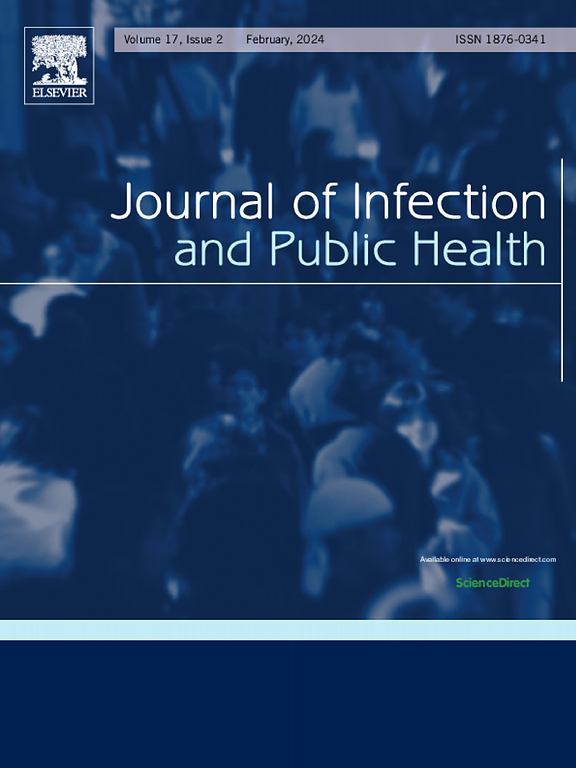Performance comparison of two dengue NS1 rapid diagnostic tests against RT-PCR: Sensitivity and specificity across infections and timeframes
IF 4
3区 医学
Q1 INFECTIOUS DISEASES
引用次数: 0
Abstract
Background
Dengue virus (DENV) is a mosquito-borne flavivirus that remains a global public health threat, particularly in tropical regions where it is endemic. Accurate and timely diagnosis is critical for optimal patient care and effective outbreak containment. While reverse transcription-polymerase chain reaction (RT-PCR) remains the gold standard for dengue diagnosis, nonstructural protein 1 (NS1) rapid diagnostic tests (RDTs) offer a more accessible alternative. However, their performance may vary with infection type, serotype, and the timing of sample collection.
Methods
We evaluated the diagnostic performance of two NS1 RDTs, Abbott NS1 and PBF NS1, against RT-PCR as the reference standard. A total of 183 dengue-positive and 40 dengue-negative samples were obtained during the 2023 dengue outbreak in Kaohsiung, Taiwan. Sensitivity, specificity, and predictive values were comprehensively assessed based on infection type, serotype, and post-symptom onset (PSO) intervals. Additionally, we analyzed the diagnostic benefits of combining NS1 detection with anti-DENV IgM serology.
Results
Abbott NS1 exhibited notably higher sensitivity (87.4 % vs. 83.1 %) and specificity (100 % vs. 97.5 %) compared to PBF NS1, though the differences were not statistically significant. Sensitivity varied by PSO, with Abbott NS1 achieving significantly higher sensitivity beyond three days (97.4 % vs. 76.9 %, P = 0.034). In secondary infections, Abbott NS1 outperformed PBF NS1 (86.8 % vs. 79.2 %). When combined with anti-DENV IgM serology, both RDTs demonstrated improved diagnostic sensitivity, particularly in secondary infections.
Conclusions
Our findings underscore the importance of context-specific diagnostic tools. Combining NS1 antigen detection with IgM serology enhances diagnostic accuracy. While Abbott NS1 demonstrated slightly better performance, PBF NS1 remains a viable and non-inferior alternative.
两种登革热NS1快速诊断检测对RT-PCR的性能比较:跨感染和时间框架的敏感性和特异性
登革热病毒(DENV)是一种蚊媒黄病毒,仍然是全球公共卫生威胁,特别是在流行登革热的热带地区。准确和及时的诊断对于最佳的患者护理和有效的疫情控制至关重要。虽然逆转录聚合酶链反应(RT-PCR)仍然是登革热诊断的金标准,但非结构蛋白1 (NS1)快速诊断测试(RDTs)提供了一种更容易获得的替代方法。然而,它们的性能可能因感染类型、血清型和样本采集时间而异。方法以RT-PCR为参比标准,对Abbott NS1和PBF NS1两种NS1 RDTs的诊断效果进行评价。在2023年台湾高雄登革热暴发期间共采集了183份登革热阳性样本和40份登革热阴性样本。敏感性、特异性和预测值根据感染类型、血清型和症状后发病(PSO)时间间隔进行综合评估。此外,我们分析了NS1检测与抗denv IgM血清学相结合的诊断价值。结果与PBF NS1相比,abbott NS1的敏感性(87.4 % vs. 83.1 %)和特异性(100 % vs. 97.5 %)均显著高于PBF NS1,但差异无统计学意义。灵敏度因PSO而异,雅培NS1在三天以上的灵敏度显着更高(97.4% % vs. 76.9% %,P = 0.034)。在继发性感染中,雅培NS1优于PBF NS1(86.8% % vs 79.2% %)。当与抗denv IgM血清学联合使用时,两种rdt都显示出更高的诊断敏感性,特别是在继发感染中。结论我们的研究结果强调了针对具体情况的诊断工具的重要性。NS1抗原检测与IgM血清学结合可提高诊断准确性。虽然雅培NS1表现出稍好的性能,但PBF NS1仍然是一种可行且不逊色的替代方案。
本文章由计算机程序翻译,如有差异,请以英文原文为准。
求助全文
约1分钟内获得全文
求助全文
来源期刊

Journal of Infection and Public Health
PUBLIC, ENVIRONMENTAL & OCCUPATIONAL HEALTH -INFECTIOUS DISEASES
CiteScore
13.10
自引率
1.50%
发文量
203
审稿时长
96 days
期刊介绍:
The Journal of Infection and Public Health, first official journal of the Saudi Arabian Ministry of National Guard Health Affairs, King Saud Bin Abdulaziz University for Health Sciences and the Saudi Association for Public Health, aims to be the foremost scientific, peer-reviewed journal encompassing infection prevention and control, microbiology, infectious diseases, public health and the application of healthcare epidemiology to the evaluation of health outcomes. The point of view of the journal is that infection and public health are closely intertwined and that advances in one area will have positive consequences on the other.
The journal will be useful to all health professionals who are partners in the management of patients with communicable diseases, keeping them up to date. The journal is proud to have an international and diverse editorial board that will assist and facilitate the publication of articles that reflect a global view on infection control and public health, as well as emphasizing our focus on supporting the needs of public health practitioners.
It is our aim to improve healthcare by reducing risk of infection and related adverse outcomes by critical review, selection, and dissemination of new and relevant information in the field of infection control, public health and infectious diseases in all healthcare settings and the community.
 求助内容:
求助内容: 应助结果提醒方式:
应助结果提醒方式:


